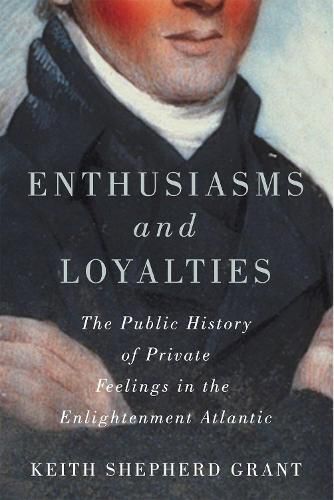Readings Newsletter
Become a Readings Member to make your shopping experience even easier.
Sign in or sign up for free!
You’re not far away from qualifying for FREE standard shipping within Australia
You’ve qualified for FREE standard shipping within Australia
The cart is loading…






This title is printed to order. This book may have been self-published. If so, we cannot guarantee the quality of the content. In the main most books will have gone through the editing process however some may not. We therefore suggest that you be aware of this before ordering this book. If in doubt check either the author or publisher’s details as we are unable to accept any returns unless they are faulty. Please contact us if you have any questions.
The Enlightenment Atlantic was awash in deep feelings. People expressed the ardour of patriots, the homesickness of migrants, the fear of slave revolts, the ecstasy of revivals, the anger of mobs, the grief of wartime, the disorientation of refugees, and the joys of victory. Yet passions and affections were not merely private responses to the events of the period - emotions were also central to the era’s most consequential public events, and even defined them.
In Enthusiasms and Loyalties Keith Grant shows that British North Americans participated in a transatlantic swirl of debates over emotions as they attempted to cultivate and make sense of their own feelings in turbulent times. Examining the emotional communities that overlapped in Cornwallis Township, Nova Scotia, between 1770 and 1850, Grant explores the diversity of public feelings, from disaffected loyalists to passionate patriots and ecstatic revivalists. He shows how certain emotions - especially enthusiasm and loyalty - could be embraced or weaponized by political and religious factions, and how their use and meaning changed over time. Feelings could be the glue that made loyalties stick, or a solvent that weakened community bonds.
Taking a history of emotions approach, Enthusiasms and Loyalties aims to recover and understand the wide range of political and religious emotions that were possible - feelable - in the Enlightenment Atlantic.
$9.00 standard shipping within Australia
FREE standard shipping within Australia for orders over $100.00
Express & International shipping calculated at checkout
This title is printed to order. This book may have been self-published. If so, we cannot guarantee the quality of the content. In the main most books will have gone through the editing process however some may not. We therefore suggest that you be aware of this before ordering this book. If in doubt check either the author or publisher’s details as we are unable to accept any returns unless they are faulty. Please contact us if you have any questions.
The Enlightenment Atlantic was awash in deep feelings. People expressed the ardour of patriots, the homesickness of migrants, the fear of slave revolts, the ecstasy of revivals, the anger of mobs, the grief of wartime, the disorientation of refugees, and the joys of victory. Yet passions and affections were not merely private responses to the events of the period - emotions were also central to the era’s most consequential public events, and even defined them.
In Enthusiasms and Loyalties Keith Grant shows that British North Americans participated in a transatlantic swirl of debates over emotions as they attempted to cultivate and make sense of their own feelings in turbulent times. Examining the emotional communities that overlapped in Cornwallis Township, Nova Scotia, between 1770 and 1850, Grant explores the diversity of public feelings, from disaffected loyalists to passionate patriots and ecstatic revivalists. He shows how certain emotions - especially enthusiasm and loyalty - could be embraced or weaponized by political and religious factions, and how their use and meaning changed over time. Feelings could be the glue that made loyalties stick, or a solvent that weakened community bonds.
Taking a history of emotions approach, Enthusiasms and Loyalties aims to recover and understand the wide range of political and religious emotions that were possible - feelable - in the Enlightenment Atlantic.